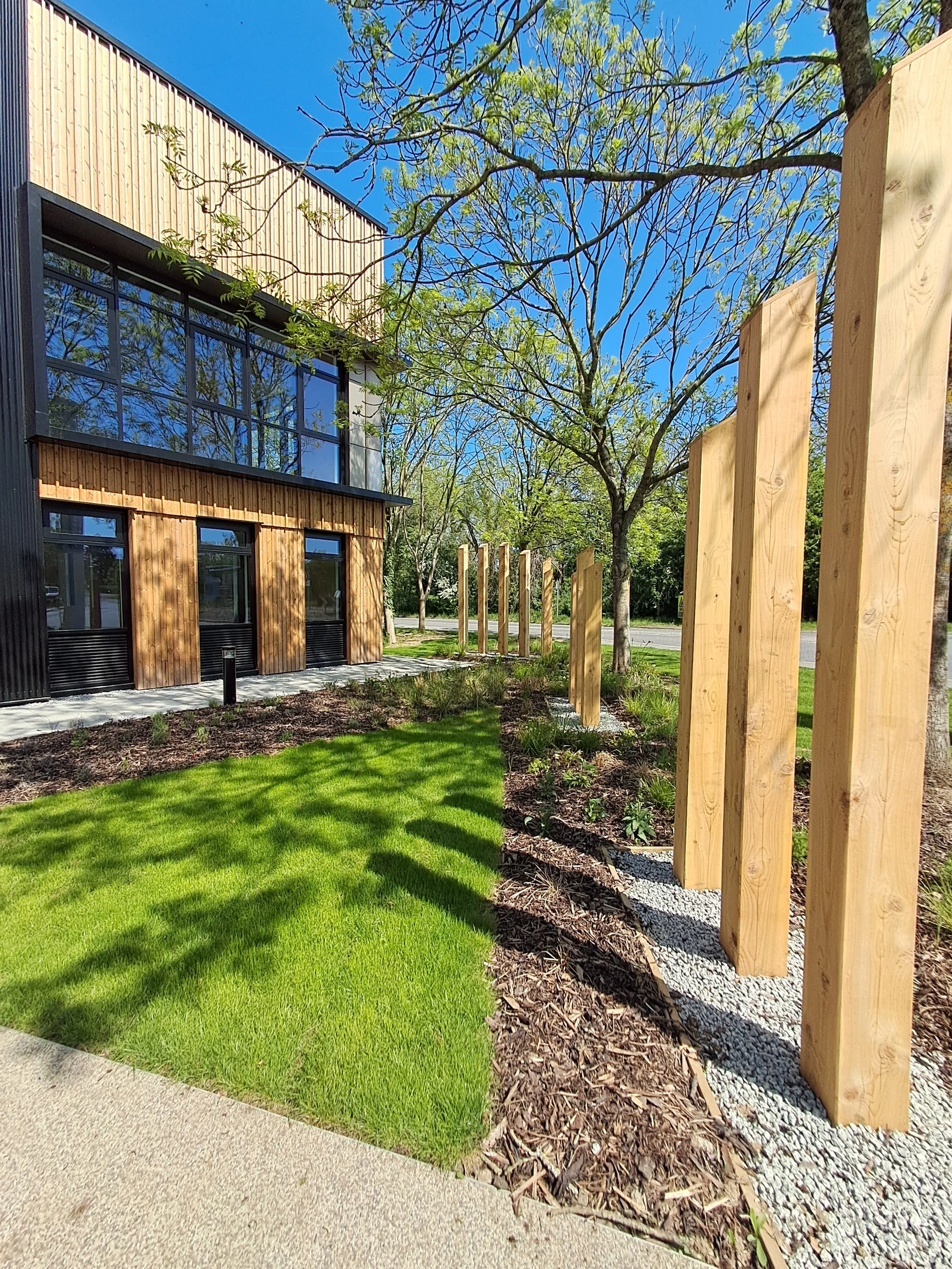Redefining R&D mid-tech buildings with a low carbon glulam frame
/Designed for flexibility, adaptability and with a low-carbon footprint, Nebula at Milton Park redefines sustainable R&D workspaces through its long-life, loose-fit design principles.
Unique to this award-winning tech box is its glulam structural frame, which achieved an embodied carbon saving of 686 tonnes of CO2e - considered a UK-first for R&D design.
"Nebula has been driven by the project team’s collective ambition to create a new R&D development which seamlessly blends design and sustainability, creating an attractive work environment for future occupiers to innovate.”
- Philip Campbell, Commercial Director, MEPC Milton Park
The Design Brief
Set within the eastern boundary of the UK’s largest single-ownership innovation community, Nebula forms part of the regeneration and development of Milton Park’s 190 Park Drive.
Consisting of three new buildings with a total area of circa 77,000 sqft, Nebula includes 7 self-contained mid-tech units ranging in size from circa 7,350 sqft to 13,300 sqft. With each tech box having a fully finished core, mezzanine offices fitted out to a CAT A, and a combination of single and double-height R&D spaces, they are ready to facilitate the latest science and technology innovation.
Nebula is the most recent example of our partnership with MEPC. With a clear understanding of client expectations and working methods, we were fully aligned with their vision, best practices, Environmental, Social and Governance principles and sustainability goals.
Our objectives were to:
Deliver flexible, energy-efficient R&D workspaces that provide a long-life, loose-fit approach with modular floorplates for changing tenant needs.
Minimise embodied carbon and optimise material reuse, following circular economy principles.
Create a showcase gateway statement for high-quality sustainable design within Milton Park.
Enhance & prioritise the transport infrastructure and support estate-wide sustainability goals
Work within the Local Development Order to develop an optimum site arrangement.
Photos above courtesy of Martin Cleveland Photography
Award Winning Design
Nebula, recently recognised as the ‘Best Commercial Project of the Year’ at the 2025 OxProp Awards, was developed with a strong focus on circular economy principles. The design team ensured alignment with BREEAM ‘Excellent’ targets, EPC A rating requirements, and Federated Hermes Design Innovation Standards.
Selecting materials to reduce embodied carbon
Nebula redefines R&D mid-tech buildings by replacing steel frame construction with a glue-laminated timber (glulam) frame and Cross Laminated Timber (CLT) floor system. This structural choice contributed to an upfront embodied carbon saving of 686 tonnes. Additionally, prefabricated slotted steel connections increased efficiency and reduced assembly times.
Maximising space efficiency while ensuring flexibility
Column-free spans, varying mezzanine sizes across units and increased glazing to R&D areas allow for different fit-out possibilities and configurations.
Integrating into the Milton Park Community and Enhancing Transport Links
Good pedestrian access, EV charging stations and cycle storage support sustainable commuting.
Providing bio-diverse landscaping and external amenity areas
Inclusion of natural grassland, native hedgerows, tree planting, and nectar-rich ornamental planting along with cedar bird and bee habitat posts all contribute to biodiversity. High-quality seating areas increase a sense of belonging and wellbeing.
Enhancing flood protection
Flood resilience was addressed through Sustainable Drainage Systems (SuDs), which can handle a 1-in-100-year storm event, ensuring long-term site protection.
Thoughtful reuse of materials
The existing slab and foundations were crushed and repurposed as hardcore. Curtain walling profiles contained 75% recycled end-of-life aluminium. Carpet tiles are sourced from manufacturers with take-back schemes, supporting closed-loop recycling, and surplus timber was donated to RAW Workshop, contributing to community reuse initiatives.
Consideration of the local community
The client and design team were committed to delivering long-term benefits for the community throughout the project. As a Considerate Contractor, Barnwood Construction, promoted local employment with a focus on apprenticeships for young people. MEPC also provided financial contributions towards improved bus services, new cycle and walking pathways, healthcare services and road upgrades where necessary.
An innovative building making space for innovation
“It has been a pleasure being a part of the design team to deliver Nebula. The project reflects a strong commitment to blending innovative design with sustainability to create a future-ready work environment for the R&D sector.”





